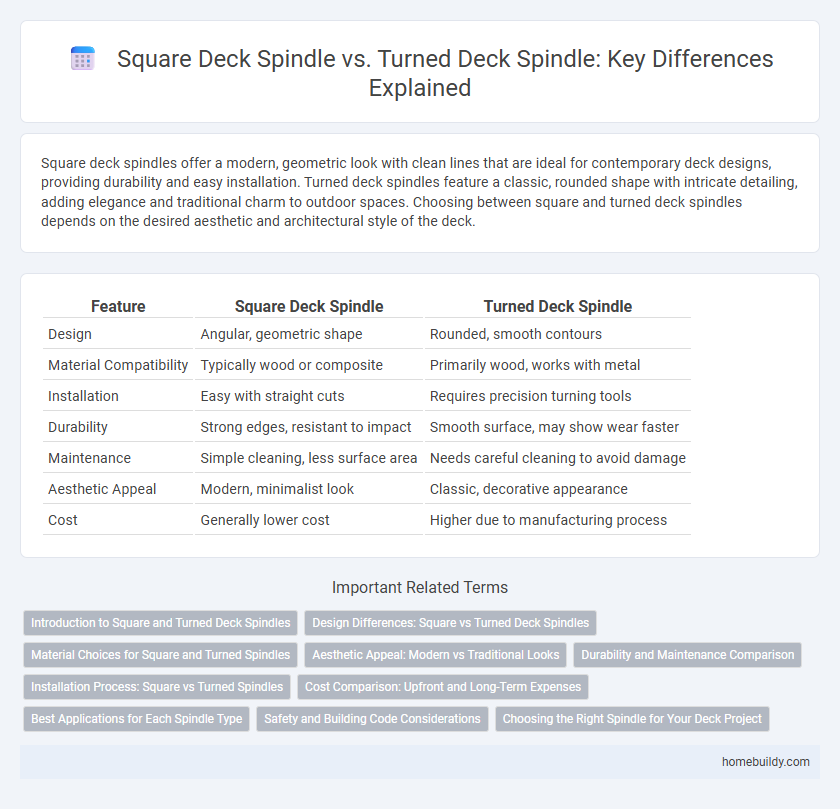Square deck spindles offer a modern, geometric look with clean lines that are ideal for contemporary deck designs, providing durability and easy installation. Turned deck spindles feature a classic, rounded shape with intricate detailing, adding elegance and traditional charm to outdoor spaces. Choosing between square and turned deck spindles depends on the desired aesthetic and architectural style of the deck.
Table of Comparison
| Feature | Square Deck Spindle | Turned Deck Spindle |
|---|---|---|
| Design | Angular, geometric shape | Rounded, smooth contours |
| Material Compatibility | Typically wood or composite | Primarily wood, works with metal |
| Installation | Easy with straight cuts | Requires precision turning tools |
| Durability | Strong edges, resistant to impact | Smooth surface, may show wear faster |
| Maintenance | Simple cleaning, less surface area | Needs careful cleaning to avoid damage |
| Aesthetic Appeal | Modern, minimalist look | Classic, decorative appearance |
| Cost | Generally lower cost | Higher due to manufacturing process |
Introduction to Square and Turned Deck Spindles
Square deck spindles offer a modern, angular aesthetic with sharp edges, providing enhanced structural support for decks and a distinctive design appeal. Turned deck spindles feature a classic, rounded profile created through a lathe-turning process, delivering elegant craftsmanship and smooth contours that complement traditional deck styles. Selecting between square and turned spindles depends on the desired visual impact and architectural style of the deck railing.
Design Differences: Square vs Turned Deck Spindles
Square deck spindles feature a more angular, geometric design created through precision cutting, providing a modern and robust aesthetic. Turned deck spindles are crafted on a lathe, resulting in smooth, rounded profiles that emphasize traditional craftsmanship and ornamental detail. These design differences affect both the visual style and structural characteristics of deck railing systems, influencing their suitability for various architectural themes.
Material Choices for Square and Turned Spindles
Square deck spindles are typically crafted from durable hardwoods like oak and maple or metals such as aluminum and steel, providing a robust and modern aesthetic ideal for outdoor settings. Turned deck spindles often use softer woods like pine or cedar, which are easier to shape but require protective finishes to enhance longevity. Material choice directly affects spindle durability, maintenance needs, and overall deck style, influencing the decision between square and turned spindle designs.
Aesthetic Appeal: Modern vs Traditional Looks
Square deck spindles offer a sleek, modern aesthetic with clean, geometric lines that complement contemporary architectural styles. Turned deck spindles provide a traditional, ornate look featuring intricate patterns and curves that enhance classic or vintage outdoor designs. Choosing between square and turned spindles depends on whether the goal is to achieve a minimalist, modern appearance or a timeless, decorative charm.
Durability and Maintenance Comparison
Square deck spindles are renowned for their robust construction, offering enhanced durability against wear and impact, making them ideal for heavy-duty applications. Turned deck spindles feature a precision-machined design that facilitates smoother operation with reduced friction, resulting in lower maintenance requirements over time. While square spindles may require occasional lubrication to prevent rust, turned spindles generally demand less frequent upkeep due to their engineered surface finish and tighter tolerances.
Installation Process: Square vs Turned Spindles
Square deck spindles provide a straightforward installation process due to their uniform shape, allowing for easy alignment and secure fastening with standard hardware. Turned deck spindles require more precise fitting and alignment because of their rounded, decorative profiles, often necessitating custom brackets or hardware for a stable attachment. The choice between square and turned spindles influences installation time, with square spindles generally reducing labor costs and complexity.
Cost Comparison: Upfront and Long-Term Expenses
Square deck spindles generally have lower upfront costs due to simpler manufacturing processes, making them budget-friendly for initial purchases. Turned deck spindles often involve higher production expenses because of precision machining, but they typically offer longer lifespan and better durability, reducing long-term replacement and maintenance costs. Evaluating total cost of ownership reveals that while square spindles save money initially, turned spindles provide greater value over time through enhanced performance and fewer repairs.
Best Applications for Each Spindle Type
Square deck spindles are best suited for robust applications requiring high torque and durability, such as heavy-duty lawn mowers and commercial deck systems where strength and longevity are crucial. Turned deck spindles excel in precision and smooth operation, making them ideal for residential mowers and equipment demanding quieter, more efficient cuts. Choosing the right spindle type depends on the mower's usage intensity, with square spindles favored for tough, high-impact conditions and turned spindles preferred for lighter, precision-focused tasks.
Safety and Building Code Considerations
Square deck spindles offer enhanced safety by providing greater grip and reduced slipperiness compared to turned deck spindles, aligning with many building codes that emphasize secure handrail designs. Turned deck spindles, while aesthetically pleasing, may not meet certain code requirements related to spacing and structural integrity, potentially compromising safety standards. Ensuring compliance with local building codes necessitates careful selection of spindle type to balance safety, durability, and regulatory mandates.
Choosing the Right Spindle for Your Deck Project
Square deck spindles offer a modern, geometric aesthetic and provide superior stability due to their flat surfaces, making them ideal for contemporary deck designs. Turned deck spindles feature rounded, decorative profiles crafted on a lathe, adding classic elegance and intricate details to traditional decks. Selecting the right spindle depends on the desired architectural style, maintenance preferences, and overall deck design, ensuring durability and visual appeal.
square deck spindle vs turned deck spindle Infographic

 homebuildy.com
homebuildy.com